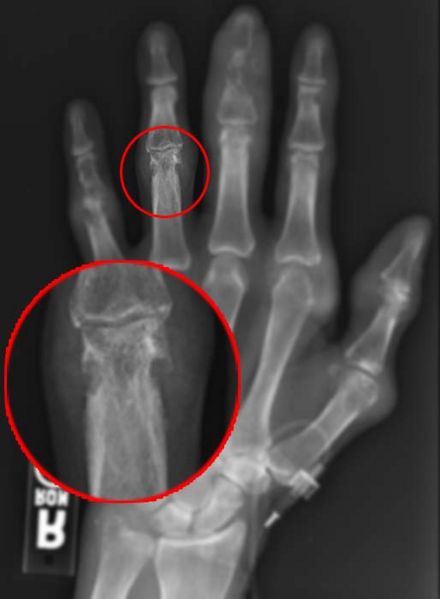Among different types of arthritis and joint pain, gout arthritis is probably one of the most severe here in the UK. Gouty arthritis results from an increase of uric acid in the blood. Such an increase leads to the formation of uric acid crystals in different parts of the body, especially the articulations.

As they form, uric acid crystals impair the normal function of the joint and may even destroy the area and the surrounding tissue causing severe deformation and pain.
The type of pain gout causes is different from other types of arthritis because it may be asymptomatic for a very long time. But when pain ensues, it is very severe, often described as excruciating.
Allopurinol is a medication that lowers uric acid levels in the blood. In theory, it would solve the problem and improve gouty arthritis symptoms. But in practice, that’s not always the case. At least not in acute gout. Moreover, there’s a common belief that allopurinol is restricted to these patients when they experience acute flare-ups. But is this accurate or a myth?
Is there some truth in the belief that allopurinol can worsen acute gout?
The difference between acute and chronic gout
The first step we should take is to differentiate acute and chronic gout. They are different manifestations of the same disease. Gout is not only diagnosed after blood tests with high levels of uric acid. This is called hyperuricemia. The diagnosis of gout requires a physical and functional examination to evidence that the articulations of the patient are being affected by such levels of uric acid in the blood. Otherwise, hyperuricemia is not diagnosed as gout.

Acute gout is characterized by severe pain located in the toes or hands, but not limited to them. The symptoms appear suddenly, sometimes in the middle of the night, and become unbearable and very severe.
The area becomes swollen, red, tender, and very warm because there’s a severe inflammatory process triggered by uric acid crystals. Pain in acute gout may last for hours, days, and sometimes a whole week. But after the attack has gone, the patient does not display any symptoms.
Gout is an old disease but its still a Problem in the UK
with thanks www.ncbi.nlm.nih.gov
Chronic gout is a type of arthritis and a complication of acute gout. We can say a patient has chronic gout if he has 2 or more flare-ups every year. Pain is usually located in more than one articulation, and during breaks, the patient may be asymptomatic or still display milder pain symptoms. When the problem becomes chronic, patients may end up with deformity and permanent damage to the articulation, as well as joint stiffness.
Treatment is different for each stage. Chronic gout as in the Knee is usually treated with allopurinol or any other uric acid-lowering medications. Conversely, acute gout or flare-ups are treated with anti-inflammatories, colchicine, and other biologic agents. But does that mean that allopurinol should never be used in acute gout?
Is Allopurinol forbidden for acute gout?
Treatment for acute gout includes medications to improve pain, which is very severe. Nonsteroidal anti-inflammatory drugs are often combined with glucocorticoids and colchicine to treat pain. Other biologic agents may also be used to inhibit interleukin-1 beta. This treatment is maintained for as long as the flare-up lasts and depending on each patient and his risk factors. When pain symptoms have improved, the patient is maintained with a low dose of anti-inflammatories to prevent additional flares.
If we go through the recommendations for acute gout, we will never find allopurinol as a suitable treatment to reduce gouty pain. Moreover, studies show that allopurinol does not have any effect on acute gout pain. It only works in chronic gout and it is meant to reduce uric acid levels and prevent a gout flare.
So, it is not recommended to start allopurinol in recently diagnosed patients who have their first acute flare-up. However, patients who are already on allopurinol should continue their treatment with this medication, even during the treatment of acute flare-ups. These patients have been already diagnosed with chronic gout, and only then will be allopurinol indicated for their therapy.
Interruption of allopurinol in patients with chronic gout during an acute episode does not provide any additional benefit. Patients who stop taking their urate-lowering medications will not improve pain faster. However, interrupting allopurinol and then reintroducing the drug may predispose to a new flare-up. Thus, the clinical practice in this matter is maintaining allopurinol in chronic patients and not starting any uric acid-lowering medication in newly diagnosed patients.
Still, there is an ongoing debate on the matter, and the American College of Rheumatology Guidelines actually recommends initiating urate-lowering therapy during an acute flare-up. Thus, the answer to this question depends not only on the individual patient but also on the clinical experience of the treating doctor.
Allopurinol and Renal impairment
One of the only ways allopurinol will be forbidden from therapy in gout is related to renal impairment. Patients with kidney damage can have life-threatening complications when they start using allopurinol, either in the acute or the chronic phase. Renal injury is a risk factor to develop a condition called allopurinol hypersensitivity syndrome.
Allopurinol hypersensitivity syndrome is a severe systemic reaction to allopurinol. It includes symptoms such as fever, skin manifestations, eosinophilia (high levels of eosinophils in the blood), and multiorgan dysfunction. There is a 25% mortality in patients who develop this syndrome, which is quite high and alarming. Thus, even though there are guidelines to prevent this from happening, doctors might prefer to use other urate-lowering alternatives in this group of patients.
In a nutshell, the main goal of allopurinol is to lower uric acid levels in chronic gout patients. There is current debate on the matter, but the majority of doctors agree that initiating allopurinol in patients recently diagnosed with acute gout is not recommended and does not have any benefit. It is only maintained in patients with chronic gout under treatment with allopurinol, and the only side effect doctors will try to avoid is allopurinol hypersensitivity syndrome, which is more common in patients with renal impairment.
References:
Taylor, T. H., Mecchella, J. N., Larson, R. J., Kerin, K. D., & MacKenzie, T. A. (2012). Initiation of allopurinol at first medical contact for acute attacks of gout: a randomized clinical trial. The American journal of medicine, 125(11), 1126-1134.
Hill, E. M., Sky, K., Sit, M., Collamer, A., & Higgs, J. (2015). Does starting allopurinol prolong acute treated gout? A randomized clinical trial. JCR: Journal of Clinical Rheumatology, 21(3), 120-125.
Drug and Therapeutics Bulletin Editorial Office. (2018). Latest guidance on the management of gout. BMJ, 362, k2893.
Hill, E. M., Sky, K., Sit, M., Collamer, A., & Higgs, J. (2015). Does starting allopurinol prolong acute treated gout? A randomized clinical trial. JCR: Journal of Clinical Rheumatology, 21(3), 120-125.
Taylor, T. H., Mecchella, J. N., Larson, R. J., Kerin, K. D., & MacKenzie, T. A. (2012). Initiation of allopurinol at first medical contact for acute attacks of gout: a randomized clinical trial. The American journal of medicine, 125(11), 1126-1134.
Gutiérrez-Macías, A., Lizarralde-Palacios, E., Martínez-Odriozola, P., & Miguel-De la Villa, F. (2005). Fatal allopurinol hypersensitivity syndrome after treatment of asymptomatic hyperuricaemia. Bmj, 331(7517), 623.

One comment